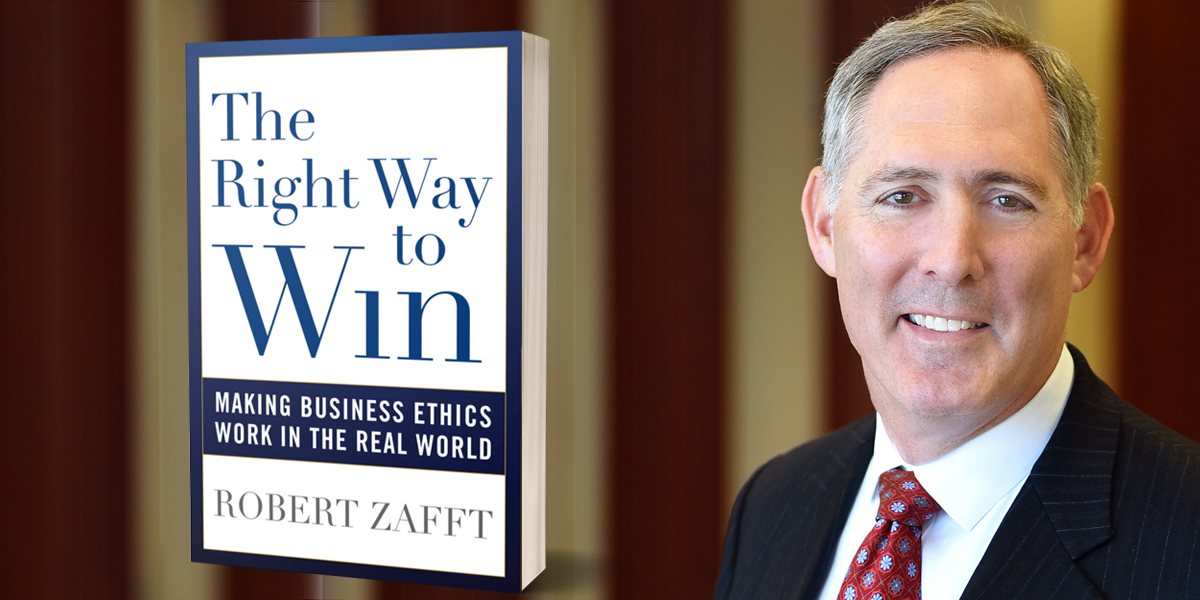Full of entertaining examples, new book is guide to making business ethics work ‘in the real world’
- September 29, 2020
- By Jill Young Miller
- 3 minute read

An ocean liner hits an iceberg in the North Atlantic. Ten people scramble into one lifeboat, and wind and waves drive the lifeboat far from other boats. The passengers have no idea where they are or when help might come.
What’s worse, the lifeboat can only hold six passengers. If four don’t go overboard into the icy water and certain death, all 10 will drown. You have only minutes to decide. Who stays? Who goes?
The lifeboat game is part of a lesson in decision-making frameworks in the new book “The Right Way to Win: Making Business Ethics Work in the Real World,” by Robert Zafft, an adjunct lecturer at Olin. Published by Rowman & Littlefield in mid-September, the book gives readers tools and techniques to encourage ethical behavior, which Zafft argues drives long-term business success.
The ideas and examples in the book come from a business-ethics course Zafft teaches at Olin. He calls the book “a stand-alone guide to making business ethics work in the real world.” It’s meant for people in the workforce and also for students in business or other programs who want to understand the basics of business ethics.
My students want the fundamentals of business ethics explained in ways that are simple, straightforward, practical and fun. That’s how I teach my course, and that’s how I’ve written my book. The lifeboat game introduces people to basic ethical frameworks in a way they’ll enjoy and remember.
Robert Zafft
Zafft is a Harvard-trained lawyer who has worked as a McKinsey & Company consultant and international expert. His own introduction to business ethics came in Moscow during Russia’s “wild 1990s, when bankers were getting blown up on Main Street at rush hour,” he said.
An emphasis on reputation
“Experience has taught me that people who treat business ethics as a back-office issue will fail,” Zafft said. His book stands out because of its emphasis on reputation, he said, “as well as concrete managerial tools and techniques for fixing and enforcing individual accountability.”
The 12-chapter book is divided into three parts. Part I describes the meaning of “ethical behavior,” and one of its chapters includes the lifeboat game. “Various ethical frameworks exist, and these can produce varying – and sometimes directly contradictory – outcomes,” Zafft writes. “Sometimes, both sides can be right.”
Part II examines what it means for a company or other organization to be ethical. It also looks at how critical reputation is to business leaders ranging from history’s “real” Godfather, Carlo Gambino, to Warren Buffett.
Part III focuses on the managerial tools and techniques for encouraging and enforcing ethical behavior throughout an organization. “These include the organizational designs and process controls which managers must put in place to define and enforce individual accountability,” Zafft writes. It also “explores the primacy of culture, which, in Warren Buffett’s view, ‘[D]etermines how an organization behaves … more than rule books.’”
The best way to rob a bank
Entertaining writing fills the book. The chapter “Organizational Design: The Who and What of Accountability” begins this way:
“‘The best way to rob a bank is to own it’ goes the old saw. In fact, robbers don’t even need to own the bank, just to work there. So it was with Wells Fargo. So it was with Enron, which was not a bank but traded like one. The individual world record for bank robbery may belong to Nick Leeson, a 20-something trading-desk manager for Barings plc. In 1995, Leeson’s unauthorized trades cost his employer over $1.3 billion, leaving it insolvent.”
Other chapters offer engaging perspectives on classic business-ethics cases including those involving Ford Pinto, Arthur Andersen and Bernie Madoff.
Mark Arian, CEO of Korn Ferry Consulting, called the book a “must read for any executive or professional focusing on making business ethics work in the real world and driving and sustaining ethical decisions throughout an organization.”
“The book focuses extensively on practical managerial techniques and individual accountability,” Arian said, “showing the reader how to do well by doing good.”
For more information, visit www.TheRightWayToWin.com.
Media inquiries
For assistance with media inquiries and to find faculty experts, please contact Washington University Marketing & Communications.
Monday–Friday, 8:30 to 5 p.m.
Sara Savat
Senior News Director, Business and Social Sciences
